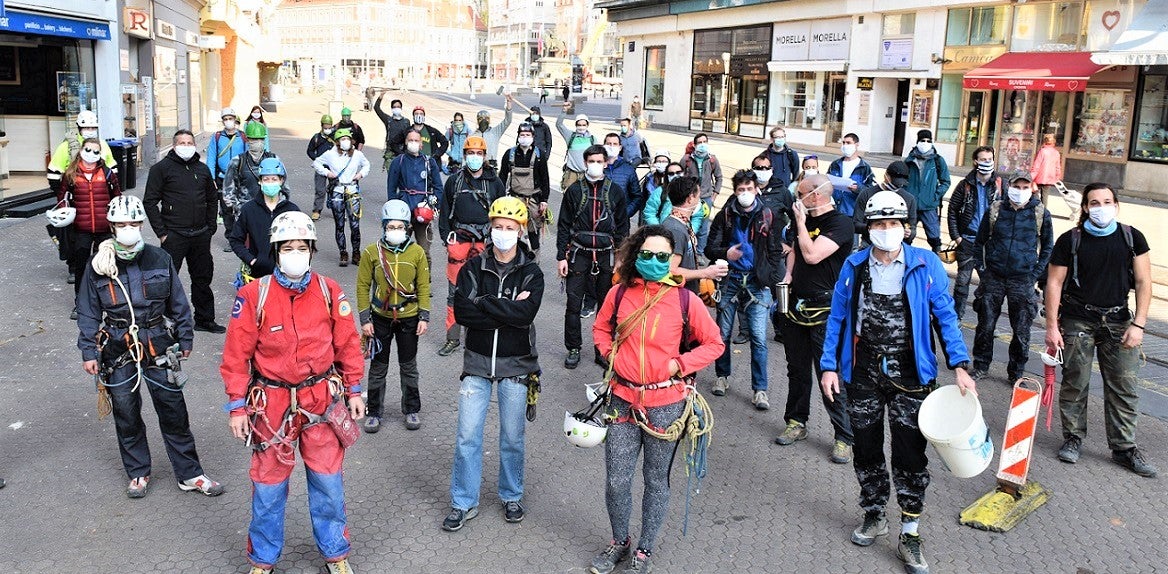 Volunteers on the streets of Zagreb after the quake
Volunteers on the streets of Zagreb after the quake
A sudden shaking. Crushing sounds. Cars honking. People running out onto the streets. Sirens blaring.
This scene may seem like the opening of a blockbuster superhero movie, but it is actually what happened on March 22, 2020 - when the strongest earthquake in 140 years hit Croatia’s capital, Zagreb, and its surrounding areas. As a result of the 5.5 magnitude earthquake, 1 person died, scores were injured, thousands displaced, and over 26,000 public and private buildings were damaged. Total damages and losses were estimated at €11.3 billion.
In Croatia, we have a saying: “nesreća nikad ne dolazi sama” or “misfortune never comes alone.” The earthquake and its multiple aftershocks happened in the middle of a nation-wide COVID-19 lockdown - damaging homes, COVID-19 testing centers, and hospitals.
We also have another saying: “pravi se prijatelji u nevolji poznaju” or “in times of need you know who your friends are.”

Governments respond to disasters through established systems comprised of teams and equipment providing critical services to save lives and property. The international community, too, helps countries in need. In this case, under the first wave of lockdowns and restrictions, the World Bank supported the Government in its rapid assessment of damages and fast-tracked the preparation of two emergency operations to cushion the blows from the earthquake, the COVID-19 pandemic, and ongoing shocks to the economy. Thanks to the Earthquake Recovery and Public Health Preparedness Project, selected schools and hospitals will be rehabilitated and reconstructed , and assistance is being provided to design a housing reconstruction support program. The project will also help build the preparedness of the public health system - focusing on protocols, supplies, and equipment for any future pandemic.
Beyond this, there are associations and the companies - along with family members, friends, and neighbors - who have stepped-up and offered a helping hand. In times of disaster, many go the extra mile to help others - transforming into superheroes.
Within days of the Zagreb earthquake, several hundred women and men volunteered their time and skills to support immediate response and recovery efforts, with thousands more making financial donations.
Many volunteers provided immediate assistance - climbers, cavers, window-cleaners, tree surgeons, and professional dancers climbed roofs to clear debris and protect citizens from falling objects. Using mostly their own equipment - ropes, harnesses, and helmets - the volunteers made hundreds of buildings safer. Under the initiative “Alpinists, Speleologists and Climbers are Helping Zagreb,” this army of “spider” men and women signed up and organized using online platforms, social media, and word of mouth.
Associations of football supporters in Croatia, who are already known for being “super” helpers in emergencies, also joined the recovery efforts. The Bad Blue Boys - the capital’s football supporters – have been active since the outbreak of the pandemic, working with the City Red Cross Society of Zagreb to help the elderly and poor by delivering food and medicine through a humanitarian aid initiative, dubbed ‘Blue Heart’. When the earthquake hit, they were on the front lines helping people, including saving mothers and newborn children from a damaged maternity hospital.

Hundreds of engineers volunteered their “brainiac” skills to assess the safety of affected buildings using a web-based, GIS-enabled platform. In addition to capturing information from the field and tracking overall progress, the system also showed buildings with citizens who were isolating because of COVID-19 self-isolation. This allowed surveyors and volunteers to conduct field assessments in line with COVID-19 hygiene, distancing, and protective measures. As the recovery process continues, this online platform also connects a community of experts, scientists and academia, national authorities, and interested citizens. The data collected informed the Government’s rapid damage and needs assessment, for which a team of World Bank experts provided technical and operational guidance.
When it comes to volunteering, some countries have well-established systems and processes to allow volunteers to be part of disaster risk management, whether in times of crisis or in preparing for one. In others, these arrangements are still nascent, but there are many opportunities - including online platforms, apps, and tools which can support engagement and outreach.
For example, in Romania, which, like Croatia, is also vulnerable to earthquakes, civil society is increasingly more engaged in disaster resilience. The national civil protection agency, the local tech community Code for Romania, and the World Bank, have been developing a new application - Resource and Volunteer Management Solution - to enable the government to quickly mobilize and utilize resources and coordinate volunteers in the event of a major disaster. The app allows volunteer organizations to register and share information, such as an overview of resources, technical skills, and number of available volunteers - all critical components for effective coordination between public and volunteer groups.
In Croatia, the “One for Another” citizen’s initiative was set up just after the COVID-19 lockdown to assist the elderly, disabled, and other vulnerable people with access to food, medicine and supplies. Following the earthquake, supported by online communication tools, this initiative quickly responded by reaching out and providing additional help to the elderly living in heavily damaged parts of the city.
These various examples from Zagreb reveal that we can all become “supermen” and “superwomen” to help others in need. An important lessons learnt is that different actors – the government, international community, and volunteers – all can play a vital role for the people in need.




Join the Conversation